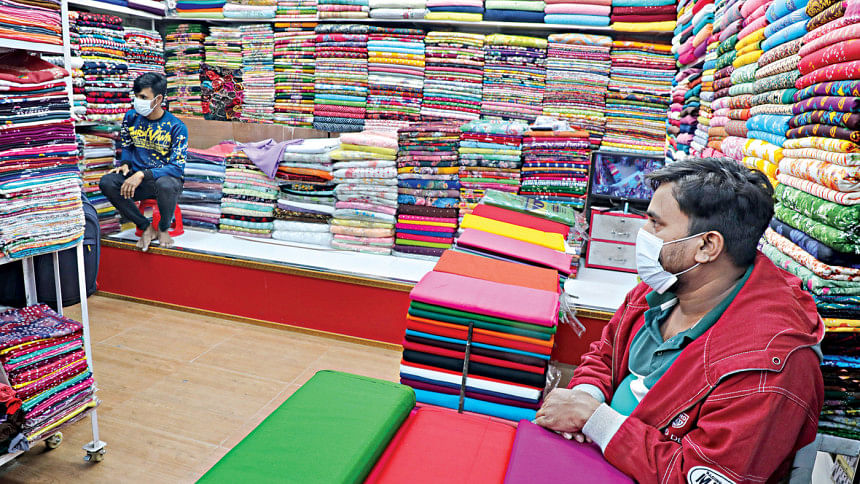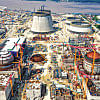Plight of small businesses only deepens

Mohammad Sohel was dusting off the shelves in his shop at the Muktijoddha Supermarket in Mirpur 1 on Wednesday afternoon as no shopper was present. In fact, he did not record any sales on the day although some shoppers did turn out.
Before the coronavirus pandemic hit the world in early 2020, his shop used to sell products worth Tk 45,000 to Tk 50,000 every day.
The amount has now come down to Tk 18,000-Tk 25,000 amid a sharp drop in sales caused by a higher cost of living. What is worse, the sales are falling day by day.
"The business has never been this bad," Sohel told The Daily Star.
"Earlier, the people who used to buy clothes spending Tk 3,000-4,000 is not making a purchase of Tk 1,000 now."
The 42-year-old, however, is well aware of the factors behind the lower sales.
"The price of everything has surged. People's expenses have increased but their income hasn't. People are actually buying less now than ever before," he said.
The businessman has unsuccessfully tried to secure loans from two banks to give a boost to his working capital. So, he was forced to let go of three of his employees in a span of two months.
His financial condition has turned so bad that he has decided to shut his shop in April. He would notify the owner of the shop about it when he would go to him to clear the rent for January.
Sohel's story echoes the struggle small retailers across the country are going through owing to persistently higher inflation and an increase in input costs and energy bills.
The situation is particularly challenging since their expenses have gone up whereas sales have declined.
Allah'r Dan Crockeries at the Chandrima Super Market in the New Market area posted 30-40 per cent lower sales in December compared to normal times.
Zane Alam Jinnah, the owner of the shop, says profit margins have fallen by 10-15 per cent.
"I am worried. I don't know what will happen in the coming days."
He is also not convinced whether it would be wise to run the business with a loan from a bank since paying instalments would be difficult.
"There is no money to save after paying the shop rent, clearing employees' wages and meeting other expenses. Sometimes, I have to borrow from friends and families under the current circumstances."
The limited-income people in Bangladesh have been forced to tighten their belts because of the cost-of-living crisis, driven by escalated prices of essential commodities and a hike in transport costs, both fallout of the Russia-Ukraine war.
Although the inflation rate has maintained a downward trend for the past four months, it is still high enough to affect those living in the middle-income category and below.
On the other hand, the monthly wage growth has remained below the inflation rate for 11 consecutive months in December, highlighting the erosion in the real income in the face of higher inflation, which stood at 8.71 per cent in December.
During visits to various retail shops in Kallyanpur, Mirpur 10, Farmgate, Moghbazar and several parts of the country over the last couple of days, the presence of customers was found to be thinner compared to normal times.
Shop owners and operators say shoppers' turnout has fallen by 40 per cent to 45 per cent.
Shamima Nasrin, the proprietor of Aangon Initiative, a retailer of jewellery items in Sylhet, says the demand for fashion jewellery has declined over the years.
"On the other hand, the cost of operation is increasing."
According to the entrepreneur, the import of jewelry raw materials such as pearls has been impacted because of the high dollar rate, which has pushed up the cost by 20-30 per cent in the last three months.
"As a result, our profits have fallen."
Nasrin plans to secure a loan from banks or financial institutions to keep the operation of the business up and running.
Amjad Hossain, a cosmetic wholesaler in Aramnagar Bazar in Jamalpur's Sarishabari upazila, says sales have dropped in half.
He says he doesn't know how to cope with the current situation. "Everywhere I look, I see no hope."
Sultan Mahmud, of Nawabganj upazila in Dinajpur, started a printing business five years ago. His sales have dropped by a quarter.
"It has happened as people have tightened their belts and cut down expenses. So, it has become hard to pay wages to staff members," he said.
Jewel Majumder, a grocer in the Banik Para area of Daulatpur in Khulna, used to register sales of Tk 35,000 to Tk 40,000 a day before the current slowdown hit.
"It is now Tk 10,000 to Tk 12,000," he said.
He said several customers had bought products on credit from his shop but they had not paid back yet. Amid lower sales, one of his two employees was laid off six months ago.
Jahangir Khan, a small shoemaker in Shariatpur district town, said that in his 34 years of business, he has never faced such a bad time.
Nearly two months ago, he laid off all of his three workers.
Previously, the factory would sell products worth Tk 3,000 a day, making a profit of Tk 1,200. The profit has slumped to Tk 300-Tk 400 due to the decrease in sales and the increase in the price of raw materials.
Khan has sought an interest-free loan from the government.
Mostofa Azad Chowdhury Babu, senior vice-president of the Federation of Bangladesh Chambers of Commerce and Industry, said due to higher inflation, the purchasing power of the common people has decreased, so sales of small traders have fallen.
He said the cost of production had increased due to the higher cost of imported raw materials for the jump in the US dollar price by at least 20 per cent against the taka and the spike in transportation costs driven by energy price increases.
According to the business leader, due to the liquidity crunch in the financial sector, no new loans are being sanctioned.
"It has also affected the small businesses," Babu added.
Kazi Iqbal, a senior research fellow of the Bangladesh Institute of Development Studies, says there is a lot of uncertainty in the election year.
"Maybe because of that uncertainty, people have reduced their consumption."
District correspondents Dwoha Chowdhury, Jahid Hasan, Dipankar Roy, Kongkon Karmakar and Shahidul Islam Nirob contributed to the report.

 For all latest news, follow The Daily Star's Google News channel.
For all latest news, follow The Daily Star's Google News channel. 








Comments